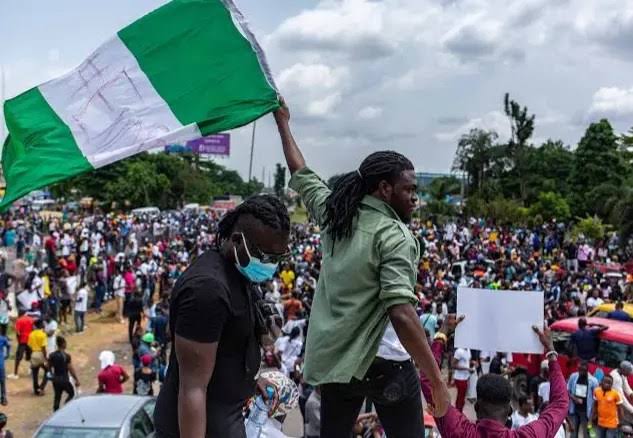Opinion: Is revolution the way forward or wait for 2027 election?

Photo of Nigerian youths protesting in the #EndBadGovernance protest of 2024. Photo Credit- Premium Times
Nigeria stands at a crossroads, its democratic process marred by a history of flawed elections that have eroded public trust and deepened systemic crises. The 2023 presidential election, which saw Bola Tinubu secure a mere 37% vote share amid widespread fraud allegations, is a clear reminder of a system that fails to reflect the people’s will. With the 2027 election looming, and the All Progressives Congress (APC) consolidating power through defections, a crucial question lingers: Can another election restore Nigeria, or is a revolution the only path to meaningful change?
A history of electoral failure: democracy in name only
Nigeria’s elections have long been a theater of chaos, plagued by fraud, violence, and institutional bias. Political analysts highlights that since 1999, every election has been filled with controversy, from the 1965 riots to the 2023 polls, where opposition parties challenged Tinubu’s victory in court. The Independent National Electoral Commission (INEC), meant to ensure fairness, has lost credibility its 2019 election conduct reduced public faith, a public that sees elections as a rigged game.
The 2023 election made these failures all the worst. With only 27% voter turnout the lowest since 1999 and reports of vote-buying and intimidation, the process failed to represent Nigeria’s 220 million citizens. Tinubu’s narrow victory, coupled with the APC’s dominance through defections, suggests 2027 will be more of the same, especially as the PDP and other opposition parties crumbles, with defections. Elections under such conditions do not restore, they reinforce a broken system, leaving Nigerians to only vote without any meaningful change.
RELATED STORIES
Opinion: How Sports Can Address Nigeria’s Insecurity, Promote Peace, Economy
Political parties: A special purpose vehicle for Nigerian politicians
Nigeria’s problems and the need for radical change
Nigeria’s challenges; rising inflation, increased poverty and economic inequalities, and multiple conflict fatalities demand more than electoral participation. The NFIU’s report of 735 mass abductions since 2019 shows a massive security crisis that elections have failed to address. Boko Haram and banditry thrive in ungoverned spaces, while corruption festers reflects a governance rot that elections perpetuate.
Tinubu’s plea for Nigerians not to criticize his mismanagement reveals a leadership unwilling to confront these issues. The APC’s consolidation, risks turning Nigeria into a single-party state, further entrenching power. The 2027 election, under these conditions, is unlikely to deliver change INEC’s history and the APC’s grip suggest a predetermined outcome. A system this broken cannot heal itself through the ballot box alone.
Revolution as an alternative: A necessary evil?
A revolution, whether through mass protests or a broader uprising offers a radical alternative to Nigeria’s electoral drama. The 2020 #EndSARS protests, where youth demanded systemic change, showed the power of collective action, even if met with violence. Drawing similarity with Burkina Faso’s 2014 revolution, ousting Blaise Compaore, forced democratic reforms, suggesting Nigeria could follow suit. A revolution could dismantle the entrenched elite politicians, military, and traditional leaders who perpetuate electoral fraud.
However, revolutions carry risks. Burkina Faso’s post-2014 instability, with coups and jihadist violence displacing millions, warns of potential chaos. Nigeria, with its ethnic, regional, and religious divides as seen with the Fulani’s attacks in Benue and Plateau states, could become worse than it is currently. Yet, the status quo is equally relatable: when elections that fail to deliver real change, the challenges definitely will have no end. However, a revolution, if guided by a unified vision, could reset Nigeria’s governance, prioritizing security, economic equity, and true representation.
The counterargument: Can 2027 be different?
Some might argue that 2027 offers a chance for reform if opposition parties like the PDP rebuild and INEC is completely reformed. The PDP’s historical base could gather the millions of Nigerians who are tired and probably lost hope in Tinubu’s administration. However, this hope lacks consistency. The PDP’s and Labour Party’s leadership crises and INEC’s track record suggest reform is a near impossibility, leaving the 2027 election as another hollow exercise.
Final take
Nigeria’s electoral system is a broken vessel, incapable of restoring a nation battered by insecurity, poverty, and corruption. The 2027 election, under the APC’s shadow and INEC’s long history of failures, offers little hope for change. A revolution, though risky, may be the only path to dismantle a system that serves the elite, not the people. Nigerians deserve a democracy that works and not one that betrays them every four years. Permit me to state emphatically that it is time for a cure, even if it takes a revolution to deliver it.

